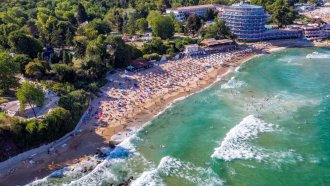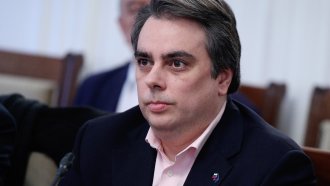Opinion:
The immediate and unlimited power of the Prosecutor General

PM Boyko Borissov is in a tight spot between trying to win Sofia and supporting Ivan Geshev
The campaign to secure Ivan Geshev, the only candidate for Prosecutor General, has become so overwhelming, it is worth rebooting the most basic of questions regarding his future office. Especially given the fact that Geshev is not only unopposed, the procedure for his appointment is so wrapped up inward in the institution of the Supreme Judicial Council – which elects the Prosecutor General – it is virtually immune from any public pressure. But protests are mounting, which in turn produce a lot of questionable PR. And while Geshev himself seems not at risk of losing the post he has been intended for, GERB and Boyko Borissov stand to lose a lot. Borissov cannot oppose Geshev even if he wants to, because Geshev is current Prosecutor General Sotir Tsatsarov’s choice and Borissov is dependent on Tsatsarov. Borissov’s position will not improve with Geshev, it might only worsen. Lastly Borissov and GERB will carry the negatives of Geshev’s appointment, when the protests and overall public displeasure will translate into votes.
The Prosecutor General’s term is seven year long. The position is essentially untouchable. The Prosecutor General answers to no one and while there is an on-paper provision he or she could be investigated for wrongdoing, this investigation would be carried out by his or her direct subordinates. The power, which the Prosecutor General possesses is unique and potentially total. Nikola Filchev, Prosecutor General from 1999 till 2006 coined a phrase, which captures the office best: he famously once said “above me is only God”. The current Prosecutor General, Sotir Tsatsarov realized the most of this potential to date. The next will likely carry on to expand this potential far beyond what we witness today. And to be fair, this is only natural, and – sadly – hasn’t much to do with Ivan Geshev, although his demeaner alone is a clear and gross account of the fact that the fight for the justice system – if there even was one – has long since concluded. But chilling fact of the matter is that Geshev not only literally but also figurately – has no alternative. Even if they decide to appoint someone else, he or she will carry the same values and will have been molded by the same ideology.
The way the Prosecutor’s Office and specifically its head position are structured in Bulgaria has been the number one criticism by the European institutions, and with good reason. And understandably, it is this exact state of affairs that cause the governments to consistently ignore the recommendations to reform the system. Even if we assume the best intentions from governments, at the end of the day, the Prosecutor General has the power (and apparent willingness) to go after enemies with the full force of the office. But such an assumption is naïve to say the least. Instead the executive branch, their shady business associates and the Prosecutor’s Office work together to capture the mechanisms and institutions of the state. Although, to be fair, the Prosecutor General has the principal upper hand always by virtue of the office and the power the law has provided it. The Prosecutor General hardly cares who he or she befriends. But the other side of this relationship is by definition dependent on the former.
Former Justice Minister and current non-parliamentary opposition leader Hristo Ivanov tried to implement actual reform several years ago. He tabled legislative amendments, which by his own account were supported by the government, led by Boyko Borissov. But to Hristo Ivanov’s surprise the bill was voted down by Borissov’s very own MPs, among others. Hristo Ivanov resigned immediately afterwards. It is not an overreach to assume that this is as far as the justice reform in Bulgaria will get. Especially with the prosecution as is, Boyko Borissov and key oligarchs locked in a mutual dependence, characteristic of joint twins or other forms of entities in a symbiosis relationship. The dependencies are key here, and the executive branch in the form of a Boyko Borissov government moving to actual reform, which would strip the office of Prosecutor General from its power is inconceivable. Evidently, this is just as true for the largest opposition, BSP, which have demonstrated time and again that they are equally incapable to stand against the prosecution.
Current Prosecutor General Sotir Tsatsarov utilized his office to help Borissov and his friends. The Prosecutor’s Office hardly prosecutes cases for the sake of justice and does not conduct them with much regard for the actual case proceeding, and so its cases often collapse in court. But the procedural process on its own is a weapon on its own. In the last 8 years, according to the Prosecutor’s Office own official data, the share of trials against the Prosecutor’s Office for damages, which it has lost has gone from 25% in 2010 to 85,5% in 2018. Not only that, but the total number of cases have increased by 65%. So the total number of lost cases for the period have jumped more than 400%! Is the Prosecutor’s Office doing its job well? Is it run well? Apparently not. And there is no mechanism in the state to prevent or counter the effect. Not doing a good job will not affect the appointment process, as its majority is either itself (prosecutors) or parliamentary appointments (mostly ruling party). If it is breaking the law, it will have to investigate itself.
In addition, over the last decade or so several borderline “specialized” bodies were established, which have the power to go further in perusing and terrorizing people of interest, under the umbrella of “fight against corruption”. They are “borderline” in different ways: establishing a “specialized” court to process cases of criminal conduct, which is already present in the penal code, itself poses the question of why they exist. These cases could just as well be carried out within the “normal” justice system, so why make the effort to established a news institution, dedicated to them. Unless the “specialized” is actually a mispronunciation of “special” and the special-ness does not stem from the nature of the crime itself (“organized crime”) but from way the cases are processed. By the way nearly half of the rulings of the Specialized Appeals Court get overturn by the Supreme Court. Then there’s the Anticorruption Commission, which is a normal commission but has law enforcement abilities. It can also freeze assets even if a court has ruled these assets legal. The commission can make such a decision on demand anytime, and it has. Coincidently, it always goes after people, deemed inconvenient to those in power.
No one who is close to power has ever been under investigation or in any way probed for wrongdoings. Media mogul and DPS MP Delyan Peevski and Ahmed Dogan – the honorary leader of DPS – famous for having said he is the one distributing the money in the country – and just got himself an entire TPP complete with a public contract for cold reserve – are immune, along with tens of others. Most of the media is either owned by Peevski, dependent on him or otherwise government-friendly. The case for the collapse of the fourth largest bank in Bulgaria, the Corporate Commercial Bank, which is practically the sole financer of Peevski’s media empire which has now managed to penetrate the public Bulgarian National Television, the public Bulgarian National Radio and the second-largest private TV network, NOVA, is barely proceeding. The fifteen-thousand-page indictment almost does not mention Peevski’s name. Ivan Geshev was one of the leading prosecutors in the case.
Ivan Geshev will undoubtedly double down on the way the Prosecutor’s Office operates, and it will double in its power, swing and ferociousness. He is a grim and disastrous prospect. Sadly though, anyone who might have been considered would be just as bad the same. The Prosecutor’s Office under Tsatsarov advanced and evolved into a dominant all-powerful institution, which controls the executive branch and is a well-structured and oiled machine. Breaking this system of dependencies, which ultimately cripple the state seems less and less likely. But at least one part of this fusion is vulnerable: Boyko Borissov facing elections. The Prosecutor’s Office, at least for now, seems impenetrable.
In other news:
Council for Electronic Media holds hearing for removal of top justice reporter from the air

Last week the National Bulgarian Radio’s top legal reporter was taken off the air by her newly appointed boss. By Silvia Velikova’s own account, she was told there is immense pressure to take her off the air at least until the procedure for appointing a new Prosecutor General is over. She apparently has been too critical of the unopposed nomination for the post.
Velikova made the apparent firing public and the case was met with immediate backlash from her colleagues at the radio and the public. No one from the other hosts of the morning show wanted to host in her place the following Friday morning. On Thursday night, around 9:00 P.M. BNR announced on its website it will shut down broadcasting for five hours on Friday morning because of a technical prophylaxis.
In its 80+ years the radio has never went off the air entirely and for so long. The Prosecutor’s Office opened an inquiry and concluded the technical director is at fault and sent the case to Sofia’s District Prosecutor’s Office. Nikolay Krastev, who took Velikova off the air resigned after a day at the job. His predecessor was made to retire after reportedly refusing to take Velikova off the air.
The Council for Electronic Media held a hearing afterwards to establish the reason why the radio stopped transmitting. During the hearing Velikova said the General Director of the radio, Svetoslav Kostov told her he was threatened and pressured to take her off the air. He had received calls from four people. Velikova said she proposed to Kostov to call PM Boyko Borissov and discuss the issue. Kostov replied that the pressure is not coming from there.
The only name, which has come up in the media as one of the four callers is long-time public relations officer for DPS Velisslava Krasteva. The information is not confirmed.
As a result, the Council for Electronic Media has decided to inform the Prosecutor’s Office officially about pressuring journalists and the management of the radio. In other words, the case about pressuring the radio to take a journalist off the air for criticizing the Prosecutor’s Office and Ivan Geshev in particular is now handed to the Prosecutor’s Office to investigate.
The Bulgarian desk of the Association of European Journalists sent an official letter to inform the Council of Europe about the Silvia Velikova story and subsequent shut down of BNR transmission.
Meanwhile, the largest parliamentary opposition the Bulgarian Socialist Party called for a special parliamentary committee to be formed and investigate the case. Likely as part of his ongoing efforts to assure he has nothing to do with the situation, PM Boyko Borissov agreed to the proposal. The concrete purpose of the committee will be to investigate who pressured BNR’s General Director to take Velikova off the air. However, such committees rarely have any real effect on a problem. To this end, Borissov was asked by journalists whether the General Director’s phone records will be requested in order to see who the four calls came from. Borissov’s response was that “the prosecution is an independent body, who am I to intervene.”
Supreme Bar Council against Ivan Geshev candidacy for Prosecutor General

The Bulgarian Supreme Bar Council issued a statement on Wednesday against the unopposed candidacy of Ivan Geshev for Prosecutor General. His nomination has received much backlash from the Bulgarian public. In response the prosecution keeps doubling down on Geshev’s candidacy. Last week the current Prosecutor General said he would vote twice for him if he had to. The PR efforts to build a favorable image for Geshev’s reach far beyond the public relations departments and have utilized the very core of the institution of the Prosecutor’s Office.
The Prosecutor General is appointed by the Supreme Justice Council after a vote. The council is made up of prosecutors and judges, half of which are appointed by Parliament. Assuming a prospective Prosecutor General is supported by the government, he or she would easily secure the support of 2/3 of the council, as seems to be the case with Geshev’s candidacy. The Supreme Justice Council has been quite vocal of its support for Geshev since his nomination. A number of other institutions, arguably all of them in one way or another close to the government or the Prosecutor’s Office, have also issued a number of letters of support and praise for Geshev.
This week the Supreme Bar Council went forward with an official position against Geshev. The council states Geshev has not demonstrated the necessary qualities for the office of Prosecutor General. Therefore “he cannot meet the high expectations the legal community – particularly the Bar – nor society as a whole have for this position”.
The Supreme Bar Council addresses the Supreme Judicial Council and requests for its members to demonstrate the necessary “will and courage to carry out a fair and just procedure (…), one that would not arouse any suspicion” as to its impartiality. The council also cites “undeniable legal and moral authority” as a necessary attribute to the future Prosecutor General. Perhaps to this end the text points to Geshev’s regular incline to treat defendants as accused criminals to the media during trials.
Two large protests already took place over the past two months against Geshev in Sofia and elsewhere. Both attracted at least 3000 in Sofia alone. A third protest is scheduled for next week. Meanwhile, last week an effort to take a top legal reporter, critical of Geshev, off the air at the Bulgarian National Radio backfired immensely and has been in the focus of public attention for the past ten days. As it ultimately led to the unprecedented shutdown of the radio’s signal for five hours on Friday morning, the Prosecutor’s Office has opened an investigation, which is led by Geshev.
Ключови думи
За честна и независима журналистика
Ще се радваме, ако ни подкрепите, за да може и занапред да разчитате на независима, професионална и честна информационно - аналитична медия.
 0 коментара
0 коментара
Екипът на Mediapool Ви уведомява, че администраторите на форума ще премахват всички мнения, съдържащи нецензурни квалификации, обиди на расова, етническа или верска основа.
Редакцията не носи отговорност за мненията, качени в Mediapool.bg от потребителите.
Коментирането под статии изисква потребителят да спазва правилата за участие във форумите на Mediapool.bg
Прочетете нашите правила за участие във форумите.
За да коментирате, трябва да влезете в профила си. Ако нямате профил, можете да се регистрирате.




